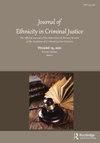Over-policing Black bodies: the need for multidimensional and transformative reforms
IF 1
Q3 CRIMINOLOGY & PENOLOGY
引用次数: 7
Abstract
Abstract This special issue of JECJ presents empirical evidence, both qualitative and quantitative, that despite several decades of attempted police reform, Blacks continue to experience policing as a repressive social institution, whether they are engaged in crime or not. The research reveals continued patterns of racially disparate treatment during traffic stops, in police response to protestors, and in mainstream media representations of protest events. Consistent with this special issue’s theme, the over-policing of Black bodies is shown to extend beyond mere “perception” to a lived experience that is documented via social media and the narratives of individuals, including former police officers, directly affected by repeat and aggressive police encounters. The researchers make several recommendations to change the current empirical reality. Their reform recommendations include: altering current police training to center the needs of the community as identified by a broad spectrum of residents, especially those who have experienced multiple forms of trauma; the reallocation of police funding to community-based crime prevention efforts; banning officers from requesting consent to search during vehicle stops;encouraging greater participation of highly policed populations in local governance and political processes; and, eliminating racial categories in government-sponsored crime statistic reports. By recognizing existing racialized patterns and working to deliberately uncouple Black racial identity from criminal identity, the U.S. can begin to reverse a long-standing culture of violence within policing that disproportionately targets Blacks.对黑人的过度监管:需要进行多方面的改革
摘要JECJ的这期特刊提供了定性和定量的经验证据,表明尽管几十年来一直在尝试警察改革,但黑人仍然将警务视为一种压制性的社会制度,无论他们是否参与犯罪。这项研究揭示了在交通堵塞、警察对抗议者的反应以及主流媒体对抗议事件的报道中,种族差异待遇的持续模式。与本期特刊的主题一致,对黑人尸体的过度监管已被证明超越了单纯的“感知”,而是通过社交媒体和包括前警察在内的个人的叙述记录的生活经历,这些人直接受到反复和攻击性警察遭遇的影响。研究人员提出了一些建议来改变当前的实证现实。他们的改革建议包括:改变目前的警察培训,以满足广大居民,特别是那些经历过多种形式创伤的居民的社区需求;将警察经费重新分配给社区预防犯罪工作;禁止警察在停车期间请求同意搜查;鼓励高度监管的民众更多地参与地方治理和政治进程;以及在政府资助的犯罪统计报告中删除种族类别。通过认识到现有的种族化模式,并努力将黑人种族身份与犯罪身份脱钩,美国可以开始扭转警察中长期存在的针对黑人的暴力文化。
本文章由计算机程序翻译,如有差异,请以英文原文为准。
求助全文
约1分钟内获得全文
求助全文
来源期刊

Journal of Ethnicity in Criminal Justice
CRIMINOLOGY & PENOLOGY-
CiteScore
1.70
自引率
16.70%
发文量
16
期刊介绍:
The Journal of Ethnicity in Criminal Justice explores the prejudice that currently affects our judicial system, our courts, our prisons, and our neighborhoods all around the world. This unique multidisciplinary journal is the only publication that focuses exclusively on crime, criminal justice, and ethnicity/race. Here you"ll find insightful commentaries, position papers, and examinations of new and existing legislation by scholars and professionals committed to the study of ethnicity and criminal justice. In addition, the Journal of Ethnicity in Criminal Justice presents the latest empirical findings, theoretical discussion, and research on social and criminal justice issues.
 求助内容:
求助内容: 应助结果提醒方式:
应助结果提醒方式:


